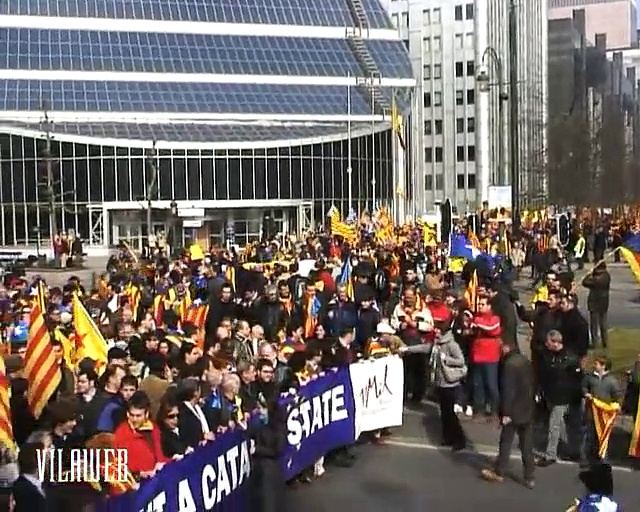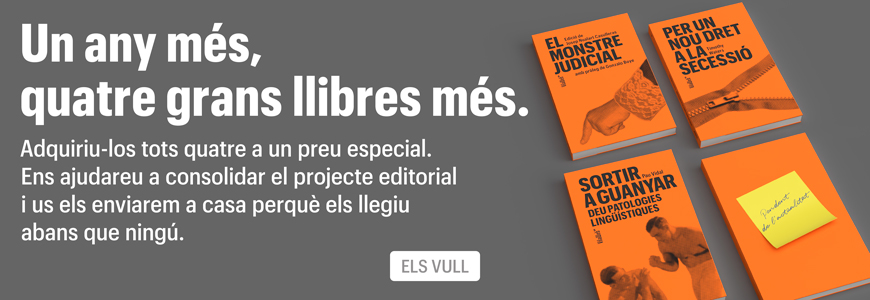29.01.2020 - 08:18
|
Actualització: 29.01.2020 - 09:18
Two weeks ago Diplocat [The Public Diplomacy Council of Catalonia, a public-private consortium set up by the Catalan government to promote international awareness of Catalonia within the international community] published a summary of a survey on Catalonia’s international image. It showed that Spain’s image has worsened and that 42% of Europeans feel that the EU ought to act as a mediator between the Spanish and Catalan governments. The recent publication of the full report (in Catalan) gives us the opportunity to learn much more as to what Europeans think about the Catalan case.
One of the most significant pieces of data is that the vast majority of Europeans (74%) believe that if a territory wishes to become independent it has the democratic right to do so. This was the majority opinion in all of the countries surveyed, though it was especially high among Slovenians (85%), Latvians and Estonians (86%). All three states gained independence relatively recently.
Europeans are also in favour of ceding more power to the regions, though the majority believe that the law must be obeyed at all times, even if this involves banning a referendum. Only in Slovenia and the two Baltic states did less than half the population agree with this point.
The role of the EU
The two positions –the right to gain independence and a respect for the law– can come into conflict when a state refuses to facilitate a political solution to certain demands. When such a situation occurs, as was the case during the Catalan process, those surveyed had differing opinions as to what the European Union’s role ought to be.
Most are in favour of either the EU mediating between the two governments or openly supporting the referendum. The two options gained the most support in Slovenia (73%), Latvia and Estonia (66%), followed by Germany (61%) and Italy (60%). In fact, France is the only country where these two options are supported by less than half of the respondents (44%).
At the other extreme, those who are in favour of the EU defending Spanish unity or refusing to take sides in matters of independence are not in the majority in any country. The fact that the EU has taken this position up to now has resulted in many Europeans objecting to the manner in which it has handled the Catalan conflict.
Recent events
Aside from having formed an opinion with regard to the major political developments which have occurred as part of the Catalan process, a significant part of Europeans have a detailed understanding of the specifics of recent events. More than 80% have heard of Carles Puigdemont’s exile in Waterloo, the referendum on 1 October 2017, the declaration of independence and the imprisonment of the pro-independence leaders.
In fact, around half of those surveyed believe themselves to be ‘well informed’ or ‘very well informed’ as to what is happening in Catalonia. This has had an impact on Spain and Catalonia’s image abroad, leading to 77% believing that the conflict has not been resolved. In total, 53% of respondents have changed their opinion with respect to Spain and 56% with respect to Catalonia, although in the opposite sense. Spain’s overall image is now more negative, since for 31% of respondents it has worsened and for 22% it has improved; while on balance Catalonia has a more positive image: 34% see it in a more positive light, compared with 23% who see it more negatively.
In terms of individual states, more than half of Slovenians (52%) now have a more negative opinion of Spain, followed by Latvians and Estonians (40%) and respondents from the United Kingdom (40%). Overall, Spain’s image has not improved in any of the countries surveyed.
Dialogue?
In terms of Catalonia, the situation is more complicated. In Slovenia, Sweden, Italy, the United Kingdom, and Latvia and Estonia, Catalonia now has a more positive image, while the news of an ongoing conflict means that the French, Germans and Swiss have a more negative impression, by a narrow margin.
Finally, it is worth noting that a majority of those surveyed believe that the Spanish government has done little to promote dialogue (61%) and has been overly authoritarian (59%), while a minority consider that Spain has ‘done what it had to do’ (37%) or that it has been too soft (23%). The results are similar to those from a recent survey by the Real Instituto Elcano, a thinktank dedicated to analysing Spain’s foreign policy. The institute’s survey also produced similar figures in terms of the number of Europeans who believe that Spain has not engaged sufficiently in dialogue and that it has been overly authoritarian.




